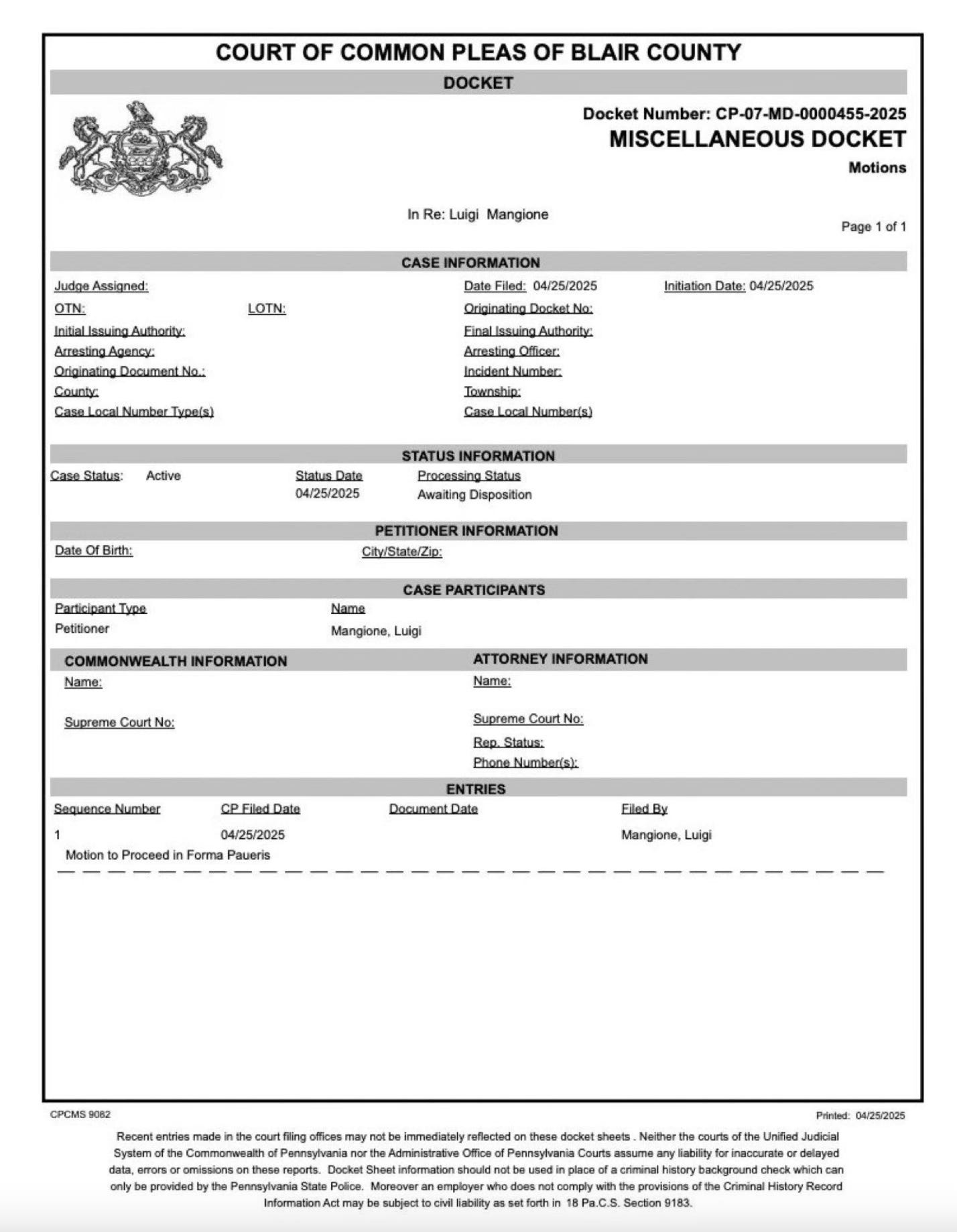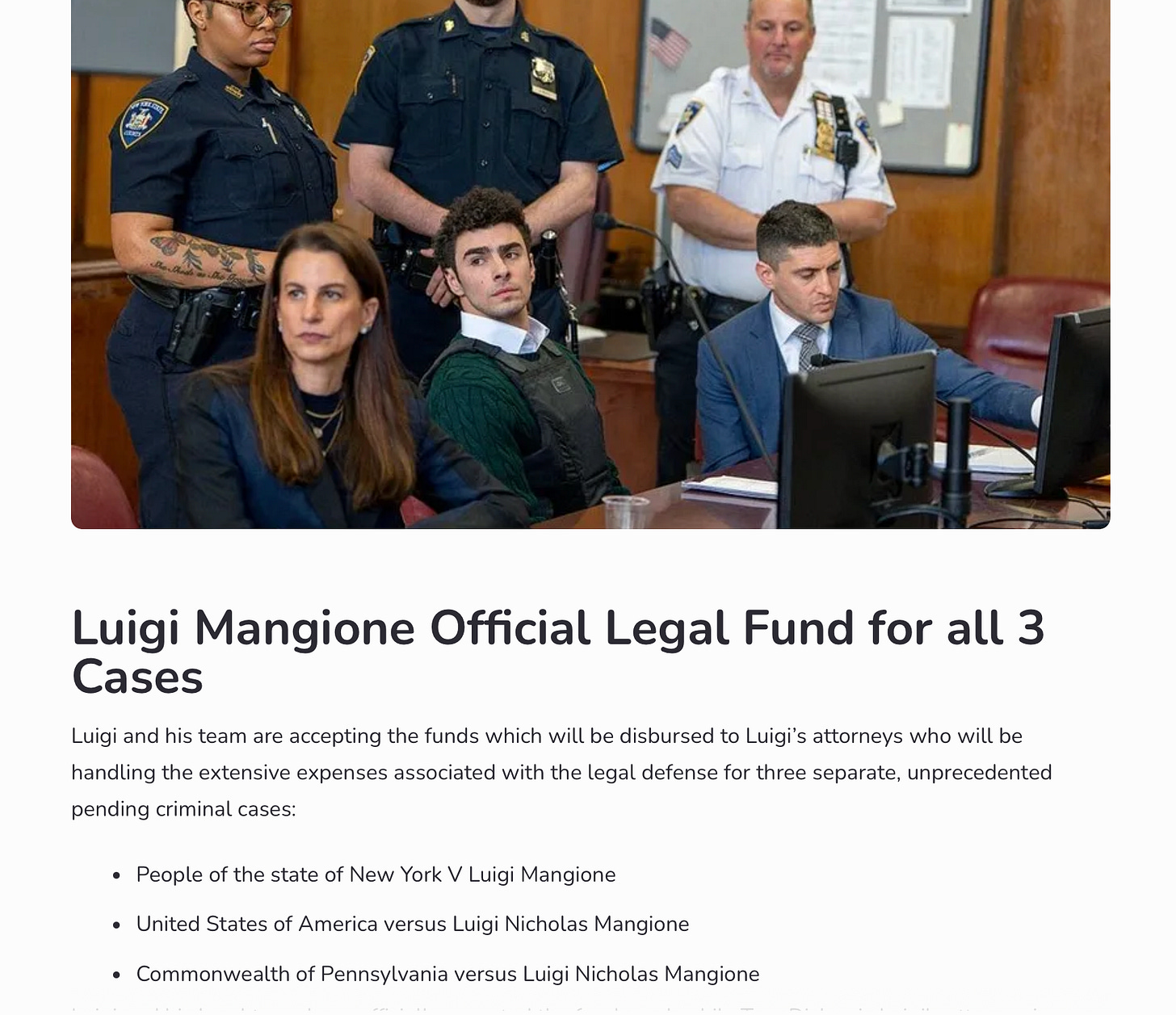An IFP Motion: What it Means
When Mangione's legal defense is crowdfunded, can he still claim he's too broke for court fees?
UPDATE
Don’t you love when you spend an hour writing a post and then you find out you might as well have written a post on Alice in Wonderland? Oh, it’s just me?
Well, actually, it’s not that bad. It’s really just about IFPs. But understanding exactly how IFP motions are utilized in Pennsylvania offers a pretty big clue about what’s going on: potential new civil case brought my Mangione against “defendant.”
Thanks to a wonderful subscriber-reader, and with the patient answers a lawyer friend just gave me to a series of questions fired at her machine-gun style, I have a better understanding of what’s going on with this motion.
IFPs are typically filed at the outset of a case, not in the middle. I noticed this here, but who am I to say what exactly the timing meant? In addition, while IFPs can be filed in both criminal and civil cases federally, in the state of Pennsylvania, they are associated entirely with civil cases.
My friend told me to think of it like applying for a home loan. The loan application won’t describe the house itself, but the application itself is highly suggestive that you intend to buy one. (Luckily I got this, otherwise my friend was going to have to make stick-figure pictures for me.)
Also, I got this: “Uh, you didn’t notice the completely new docket number?”
No. No, I didn’t.
So this IFP motion implies that Mangione intends to file a lawsuit. Now if the court grands the motion, the next step is for Dickey to file the actual complaint.
With that cleared up, the question becomes—why? Why not pay the court fees for this civil case? Or was this done as a kind of head’s up to the public to get us talking, as we’ve done? The most relevant piece to the original post, now, is the question of whether Mangione’s legal defense fund will be considered as part of his assets.
So—yeah, that’s the deal. And it’s kind of exciting to learn that a new civil complaint may be filed. I won’t speculate about who Mangione might be suing, considering my success rate with speculation today.
But let me know what you think about the likelihood that Mangione’s legal fund will be used by the Pennsylvania court to determine if he meets indigence standards for this forthcoming civil case.
Original Post (annotated)
Disclaimer: I am not a lawyer. And I’m starting to wonder if I should change the Substack name to this.
Today (April 25, 2025), Luigi Mangione filed a motion to proceed in forma pauperis in Blair County, PA. In some ways, this is a routine legal filing. It is simply a petition from a defendant claiming he cannot afraid to pay court costs1. (It has nothing to do with whether he can pay for his legal representation.)

But because this is the Luigi Mangione case, and because Mangione has amassed close to a million dollars in donations to his legal fund, this motion is raising some eyebrows.
First, no matter how you feel about Luigi Mangione, we can all agree that it is remarkable that a heretofore unknown individual, accused of a targeted murder, has inspired so much support among everyday Americans that he has managed to raise nearly a million dollars for his legal defense.
Second, this fund contains a million reasons why Mangione should, theoretically, be able to pay for his court fees. After all, the GiveSendGo page explicitly states that money raised will go into an “official legal fund for all 3 cases.”
If you’d like a quick primer on an IFP motion, you can take a look at this document published by the Clerk’s Office of the Supreme Court of the United States (see Rule 39). If you’re interested in how Pennsylvania specifically handles IFP motions, this helpful ACLU-PA Legal Guide to Proceeding In Forma Pauperis may be of interest.
You may be wondering if Pennsylvania treats IFP motions different from a federal court. The answer is yes, because Pennsylvania handles these motions under its own state rules. That said, those rules don’t differ dramatically. Briefly, in Pennsylvania, Mangione would need to provided a detailed affidavit about his employment status, monthly income, debts, any assets he might have, and expenses (more on expenses in a minute).
A federal court sometimes includes an early frivolity screening. While the federal court asks for basic financial information, it doesn’t require the kind of detailed affidavit Pennsylvania does.
Pennsylvania’s rules on IFP filings (Pa.R.C.P. No. 240) does not explicitly require disclosure of financial assistance from family, friends, or other third parties. But it’s far from clear to me (remember NAL!) whether the Pennsylvania judge will somehow take the fundraiser into account.
The reason I’m not sure about this is because I don’t know exactly how that GiveSendGo fund is structured. And how it’s structured may play a role in whether it will be considered in his IFP motion. If Mangione cannot access or control this fund, it’s possible it may not be considered an “asset” or “income.” On the other hand, if Mangione can in fact access these funds in some way, the Pennsylvania court may be able to factor them in.
(If you happen to be a lawyer practicing law in Pennsylvania, feel free to message me about this2.)
Verbiage on the Mangione fundraiser page could be interpreted as indicating that the fund has been set up so that Mangione himself has no direct access to the funds raised. I’ve bolded what I think is the relevant sentence in the quote directly from the GiveSendGo page.
Luigi and his team are accepting the funds which will be disbursed to Luigi’s attorneys who will be handling the extensive expenses associated with the legal defense for three separate, unprecedented pending criminal cases:
People of the state of New York V Luigi Mangione
United States of America versus Luigi Nicholas Mangione
Commonwealth of Pennsylvania versus Luigi Nicholas Mangione
If the funds are to be disbursed explicitly to Mangione’s attorneys, then is this fund, in fact, a personal asset? Probably not.
However, the phrase “handling the extensive expenses associated with the legal defense,” suggests this fund should be used to pay for Mangione’s Pennsylvan
ia court fees.
But read a little further in the fundraiser description, and there’s this line:
Luigi and his legal team have officially accepted the funds and, while Tom Dickey is Luigi's attorney in one of the cases, Karen Friedman Agnifilo is representing Luigi, and the funds will be used across all three cases.
This states that Luigi himself, along with his legal team, “officially accepted the funds.” I know we’re dissecting words here, but as you know, dissecting words is sort of what lawyers and judges do.
Finally, I said I was going to come back to “expenses.” Will the Pennsylvania court allow Mangione to include his legal fees as "expenses? If so, I imagine those expenses as substantial.
Why Mangione decided to file this IFP is another question, and since it’s Friday at five o’clock, let’s call it a question for another day…or for the comments3.
As always, my messages are always open to corrections, ideas, theories, leads, research, etc..
Note: thank you to my subscriber, Maggie (who writes the trenchant and topical Femme Savant substack), for the heads up about this motion.
I’ve since learned that IFP motions are filed, in Pennsylvania, prefatory to the filing of civil complaints only, not criminal matters.
Never mind, was set straight about IFPs by a fine legal mind this afternoon.
And yet we didn’t call it a day, did we?







That might be the fastest update to a post I've ever done. In my life as a novelist, speculation doesn't require an update. If it sucks, I just delete it and start again! But in discussing the Mangione trial, it's imperative that I update my speculation with facts as soon as I have them. Please take a look at my update to this post. I'm also footnoting the original post to indicate my initial misunderstanding of how IFPs are filed (in state courts, typically only for civil cases) and the new docket number.
I saw an explanation on Reddit that seemed plausible. It’s a new filing and Luigi is the petitioner and is basically saying “you pay the court fee” to whomever the defendant(s) is. He’s filing a complaint against someone in PA. However, I don’t think court filing fees are that expensive and I think to most laypeople this seems odd considering he would certainly have enough money for a filing fee.
https://www.reddit.com/r/FreeLuigi/s/4kgk2iVoFX